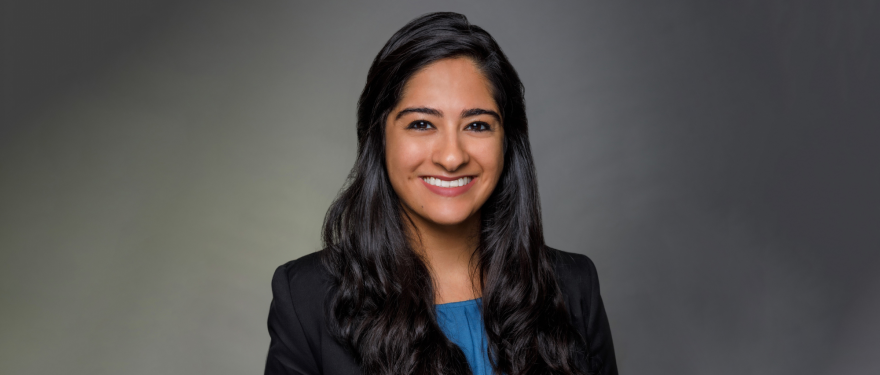Ananya Zutshi (MS/MBA 2021) wanted a career in pharmacology biotech, but wasn’t sure if she wanted to be on the management side or scientific side. She studied biomedical engineering as an undergraduate at Duke University, where she participated in genetic and tissue engineering research. Zutshi originally planned to pursue a Ph.D., but instead spent four years at Catalent Pharma Solutions, a leading pharma/biotech contract manufacturing development organization. Surrounded by potential career paths in the industry, Zutshi wondered if she needed an advanced degree to stay in the field.
“I started to really think about what I wanted to do, and where a Ph.D. would get me,” Zutshi said. “Did I want to be calling all the scientific shots? Or was I good with being part of a team and helping make things happen?”
Realizing her excitement around being part of the team, Zutshi decided not to pursue a Ph.D. However, she now knew that she likely needed another advanced degree to be a decision maker in an industry like pharma/biotech. Zutshi joined the second-ever cohort of students in the MS/MBA in Engineering Sciences degree run jointly by the Harvard John A. Paulson School of Engineering and Applied Sciences (SEAS) and Harvard Business School (HBS).
During her time at Harvard, Zutshi discovered the power of entrepreneurship and translation of novel technology. Within a year of leaving Harvard, Zutshi had founded and become CEO of her first company: Guardian Bio, a pharma-biotech company developing a novel therapy to combat cancer.
“Entrepreneurship wasn’t something that had ever been on my radar before Harvard,” said Zutshi. “I found it so powerful, the idea of marrying the technical and business side of things. I love the technical side, am so proud of my engineering training and will call myself an engineer forever. But I recognized that my strengths and experiences are well suited for the business side of drug development.”
Guardian Bio’s cell therapy uses dendritic cells, an essential component in the human immune response. If the immune system were a playing field, dendritic cells would be the coach responsible for telling the T-cells what to attack and what not to attack. Guadian Bio develops a rare subset of dendritic cells critical for activating killer T cells which can be designed to target cancerous cells. These cells can then be injected into a human body to kickstart the natural immune response.
“What’s become clearer over the last couple years is that cancer patients have bad dendritic cells,” Zutshi said. “They don’t have as many, and the ones that they have don’t work as well, which makes sense. If you are cancer and want to effectively keep the body from fighting you, you want to make sure the body can’t recognize you, and can’t be trained against you.”
Harvard introduced Zutshi to dendritic cells. She first learned about them through bioengineering courses with Samir Mitragotri, Hiller Professor of Bioengineering and Hansjorg Wyss Professor of Biologically Inspired Engineering, and David Mooney, Robert P. Pinkas Family Professor of Bioengineering. After finishing her degree, she stayed at Harvard for another year as an HBS Blavatnik Fellow in Life Science Entrepreneurship, which is when she began developing her company. Based in Boston, Guardian Bio was accepted into the Y Combinator accelerator program and officially launched in June 2022.
Zutshi’s desire to help fight cancer isn’t just a business choice – it’s personal as well. Her father died from cancer right after she left Duke. At the time, some of the first cell-based therapies were in clinical trials, but none could treat his specific disease. Years later as a Blavatnik Fellow, the more she studied cancer and existing therapies, the more Zutshi wanted a new approach.“There are a lot of treatments in the world that are iteratively better,” Zutshi said. “And those are important. We need those treatments."
This student profile was originally published on the Harvard John A. Paulson School of Engineering and Applied Sciences (SEAS) website.

